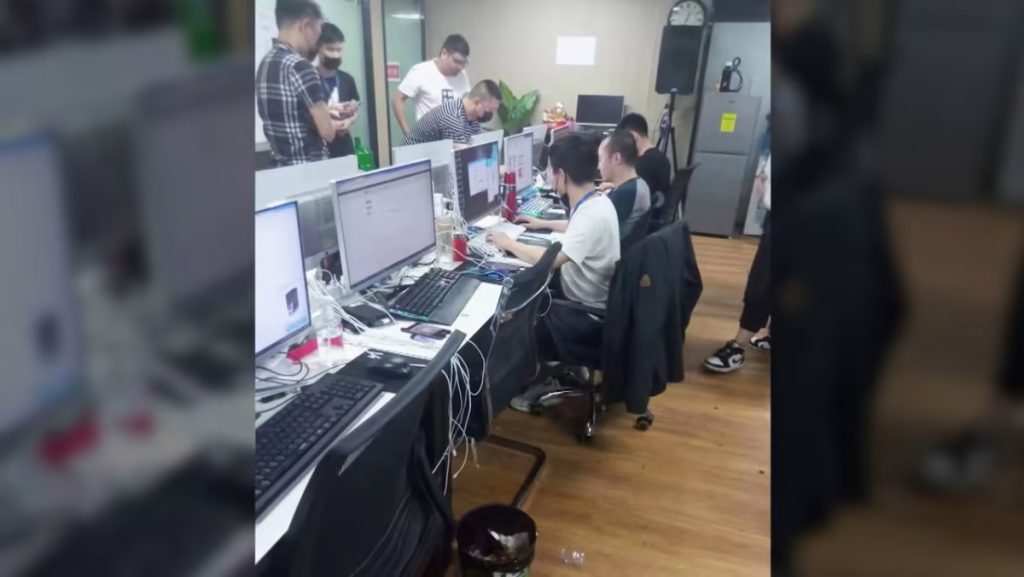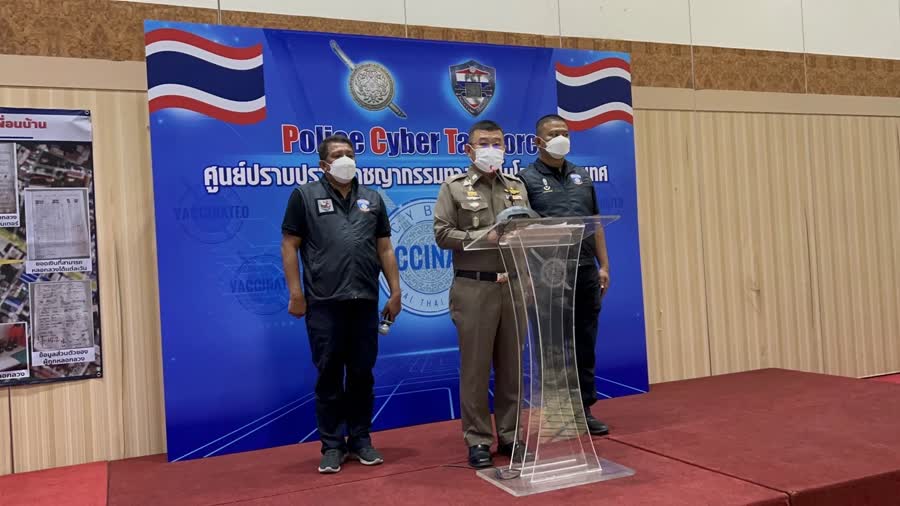A 68-year-old housewife lost 1.5 million baht in savings within 30 minutes after she answered a phone call from a gang of scammers. A member tricked her by posing as a bank agent and telling her she was eligible to receive 5,000 baht from a new government financial aid scheme.
They asked if she wanted to receive the money through a bank branch or a mobile banking app. Receiving money online was her preferred choice. The agent told her to add a Line account. She clicked on a provided link and gave all her details, including her 13-digit ID card number, date of birth and photo.
After completing the process, the scammer told her the information could not be processed. The gang gave link after link until she finally realised she had been scammed. But it was too late: within 30 minutes, she had lost 1.5 million baht in life savings.
In a second instance, an 82-year-old woman named Ms. Sonklin attempted to end her life by writing a letter to her two adult children outlining her final intentions. She had lost 2.5 million baht of her funds to a gang of con artists who said the authorities had discovered contraband in a package that was about to be sent to her through a Phuket post office. They advised her to lodge a complaint with the resort island police.
Living in Bangkok with her 83-year-old bedridden husband, she said she could not do so. The scammer told her to add a Line account to talk to the police.
A fake police officer then asked her for her personal information and send him money. He taught her how to install a mobile banking app.
She transferred almost 2.5 million baht to the scammer in two weeks before the gang vanished. When she realized she had been duped, she attempted suicide, but fortunately she survived.
Another case was a 67-year-old housewife in Udon Thani province who committed suicide after being duped out of 300,000 baht.
“Elder retirees are one of the scammers’ targets because they have money and time,” said Pol Maj Gen Atthasit Sudsa-nguan, deputy commissioner of the Cyber Crime Investigation Bureau (CCIB).
”Facing persuasion and threats, the elderly tend to believe the first [scam] message they receive.”
Police Overwhelmed Over Scam Gangs
He said that from March 1 last year to Nov 10 this year, police dealt with 360,000 cases related to cyber crime, including online fraud and fake loans. The total damage was worth about 49 billion baht.
“We believe the real number of cases may be higher than recorded because some victims do not file complaints,” he said.
“Although police work hard to arrest those in scamming networks, it is better if people can prevent becoming victims in the first place.
“When the public receives calls or messages claiming to be official, hang up first. Then, look up the real number of the alleged agency and recheck the information.”
Do not click on links sent via Line or SMS and refrain from making transactions out of fear, he said.
If someone thinks he or she is a victim, they should call the Anti Online Scam Operation Centre’s 1441 hotline for help, he said.
Common Threat in Thailand, China and Japan
These types of scams are common in Asia as 60% of residents in the region face at least one attempt per week, according to the 2023 Asia Scam Report released on Nov 20 by the Global Anti-Scam Alliance (Gasa) and Gogolook.
Their study surveyed almost 20,000 participants from 11 nations in Asia, including China, Thailand and Japan.
It found that phone calls and SMS were the most popular method of communication for scammers in Asia. Amid the increasing popularity of digital services, scammers are rapidly shifting to using messaging apps such as WhatsApp, Telegram and Line.
Scammers are also active on social media platforms such as Facebook and Instagram.
In Thailand, the study found the top five “channels” for scammers are the phone (88%), SMS (59%), instant messaging apps (27.8%), social media (16.8%) and digital advertising (14.1%).
Among digital platforms, Facebook is the number one channel (47.3%), followed by Line (40.4%), Gmail (10.6%), TikTok (9.2%) and Instagram (6.1%).
The study also found the most popular techniques in Thailand involved goods delivery fraud (17.9%), credit card fraud and identity theft (15.2%), investment scams (9.1%) and government or banking scams (8.8%).
“The shadows cast by scams is looming larger across the digital expanse of Asia,” said Jorij Abraham, managing director of Gasa.
The report can equip stakeholders with knowledge that can serve as both a shield and spear against fraudulent actors operating within Asia, he said.
Police Give Emotional Appeal
Pol Lt Col Saksit Choobunrueang of the CCIB said people fall victim to call centre gangs because they lack the knowledge to identify scams. They are lured by incentives that are too good to be true, he said.
“Most victims do not know they are tricked until it is too late because call centre scam gangs are always developing new tricks that trigger emotions such as fear or greed,” he said. “The best way [to avoid being scammed] is stay aware and not panic.
“Whatever tricks they have, they want to lure you into transferring money,” he said. “So, don’t believe it if someone calls you and says you are involved in an illegal activity. Just hang up.”
He said the police will try to eliminate the problem by arresting holders of mule accounts. Without them, money cannot reach gang leaders, he said.
Stolen money is generally transferred to “several layers” of mule accounts before reaching the top, similar to the shape of a pyramid, he said.
At the top, the money is used to purchase cryptocurrency or other valuables such as gold, he said. If not, cash is carried across the border into a neighbouring country where the gang leaders reside, he added.
“Their work is quick. Within 30 minutes, the money is gone,” he said. “Once the money is exchanged into cryptocurrency, it will be hard to trace.”
When asked why police can only arrest mule account owners instead of the masterminds, he said most scams are international crimes and the criminals are based in neighbouring countries, making arrests difficult.
Thai’s Taking part in scams
The government recently repatriated about 300 Thai nationals from Myanmar’s Laukkai, in the northern Shan state. Most of them were lured by fake job offers on social media. Some were victims of human trafficking but others were willing to take part.
Surachet Hakpal, deputy commissioner of the Royal Thai Police, said that some faced arrest warrants for allegedly opening mule accounts for scams.
Thai nationals in Cambodia’s Poi Pet city in western Banteay Meanchey province had also asked the government to help with their repatriation, Pol Gen Surachet said.
On Dec 1, the Pavena Foundation for Children and Women brought 16 victims of a call centre gang in Cambodia to report to police.
They were lured to work in Poi Pet with promises of good salaries but ended up forced to work for the gang, said Pavena Hongsakul, foundation chair.
Ms Pavena said they were told to open bank accounts to receive their salaries but after travelling to Poi Pet, their passports, mobile phones and bank books were seized by a Chinese gang leader.
They were tortured using electricity when they resisted to follow the leader’s order, she said. One victim, a 19-year-old girl, was raped by the gang leader, she added.
The gang sent the group back after learning all 16 bank accounts had been suspended by the police.
The police charged the 16 people with owning mule accounts that caused 20 million baht in damages. The foundation took them to the police to say that they were in fact the victims.
“Do not fall for false advertisements on social media offering good paying jobs in neighbouring countries,” Ms Pavena said. “There are no such offers.”
As for victims who lost their money to call centre gangs, they tend to never get it back.
“It is hard broken to tell my Mum [Sonklin] that all of her life savings are gone,” said Trakul, her son.
“She always asks me if she will get her money back. Police can catch mule account owners but not get the money back. I hope the police can catch the mastermind and I wish my Mum’s will be the last case,” he added.










